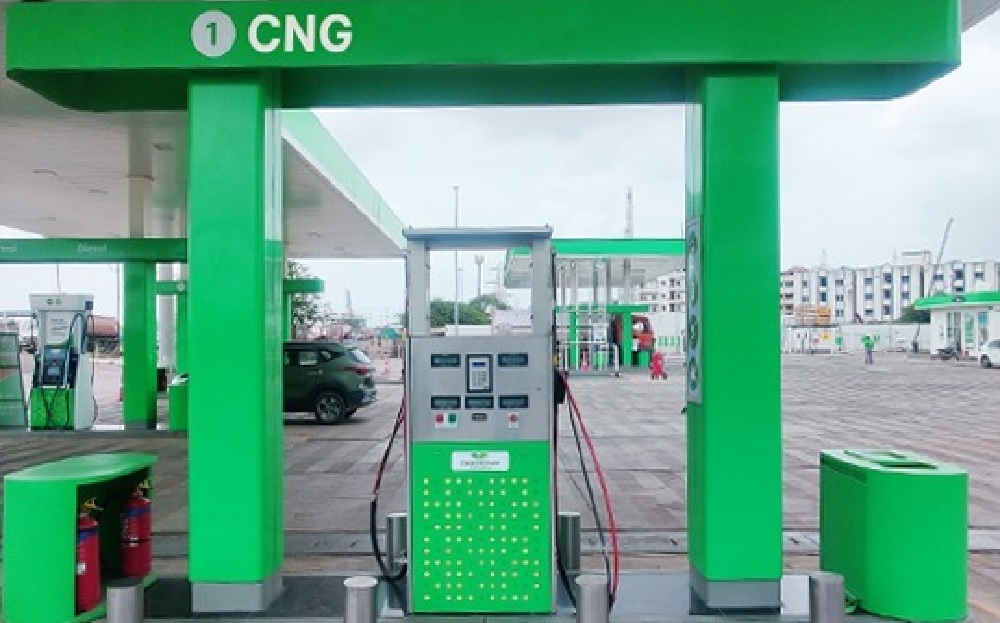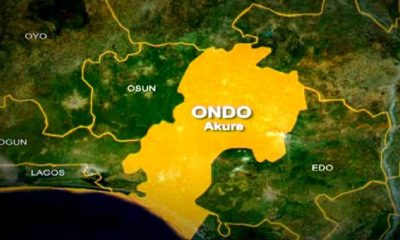Economy
Sustainable Transportation: There Is No Going Back On CNG – FG

Stakeholders say they are optimistic about the future of sustainable transportation, envisioning a greener, more efficient road transport system.
With fuel subsidy gone, the Nigerian government has been seeking new avenues to cushion the economic effect on citizens with regards to cost of transportation, and one of such initiatives is the drive towards Compressed Natural Gas (CNG) which stakeholders now believe will be a more sustainable and economical fuel alternative in Nigeria.
At a recent forum in Abuja key stakeholders having deliberated for hours, concluded that there is no going back on the adoption of CNG as it avails Nigerians a more cost efficient fuel which is friendly to their purses and to the environment.
At the stakeholders meeting convened by the Presidential Initiative on CNG (PCNGI) and Portland Gas, in partnership with the National Agency for Science and Engineering Infrastructure (NASENI), it was agreed that the adoption of CNG is a more sustainable way to transform the nation’s transport system.
Tosin Coker – a representative of Engr. Michael Oluwagbemi, head of the PCNGI, opened the session by emphasizing the government’s dedication to promoting CNG as a viable and sustainable alternative to traditional fuels.
Mr Coker highlighted the potential of CNG to significantly reduce carbon emissions and improve the overall efficiency of Nigeria’s transportation sector.
He further revealed that the federal government is offering subsidy for public transporters to convert their vehicles to compressed natural gas as part of effort to accelerate the adoption of CNG to reduce the use of premium motor spirit.
Stakeholders had lamented that it would cost between N1.2 million and N1.5 million for the kits required to convert petrol or diesel-powered vehicles to start running on CNG, however, Mr Coker in assuaging theses fears, revealed that the government has attracted foreign investment to the tune of 50 million dollars and as such interventions will be implemented to reduce the conversion cost.
Chief Aloga Ogbogo, Executive Secretary of the Road Transport Owners, spoke on the practical benefits of CNG for road transport operators. He underscored the economic advantages, noting that CNG adoption would lead to lower operational costs. He also called for an increased government support to ensure a smooth transition to CNG across the transport sector.
Providing insights into the technical support and infrastructure development necessary for the widespread adoption of CNG, Mr. Folajimi Mohammed, Managing Director of Portland Gas, assured stakeholders of Portland Gas’s commitment to facilitating this transition.
He noted that as partners with the government, all necessary infrastructure and technical expertise to ensure a smooth and efficient transition to CNG for transportation in Nigeria will be made available.
The meeting concluded with a consensus on the urgent need for collaborative efforts to accelerate CNG adoption in Nigeria even as stakeholders say they are optimistic about the future of sustainable transportation, envisioning a greener, more efficient road transport system.
Economy
SEE Black Market Dollar (USD) To Naira (NGN) Exchange Rate Today 12th May 2025

Below is the black market exchange rate for the US Dollar to Naira as of Sunday, May 11, 2025. These are the rates at which you can exchange your dollars for naira.
Black Market Dollar to Naira Exchange Rate (Aboki FX)
According to sources at the Bureau De Change (BDC) in Lagos, the dollar was bought at ₦1625 and sold at ₦1630 on Sunday, May 11, 2025.
Important Notice:
The Central Bank of Nigeria (CBN) does not officially recognize the parallel market, also known as the black market. The CBN advises anyone seeking foreign exchange to do so through their commercial banks.
Dollar to Naira Exchange Rates Today
Market Type Buying Rate Selling Rate
Black Market (Aboki) ₦1625 ₦1630
CBN Official Rate ₦1608–₦1614 –
Please note: Exchange rates may differ depending on the vendor or location, and the rates presented here might vary slightly from the actual rate at the point of transaction.
Economy
Naira Gains Slightly Against Dollar On May 8, 2025

On Thursday, May 8, 2025, the naira is exchanging for ₦1,627 to 1 US dollar at the parallel market (black market) in Nigeria.
This reflects the current rate at which individuals are trading dollars for naira outside of official financial institutions.
This means that for every one dollar, you can get the equivalent in naira of ₦1,627 on May 8, 2025, showing a very slight improvement compared to the previous day, indicating a momentary easing of pressure on the naira against the dollar.
Thursday, May 8, 2025, records a marginal upward movement in the exchange rate, suggesting a bit of stability in the local currency for those transacting in foreign exchange.
The black market rate represents the value at which individuals can trade their dollars for naira outside official exchange channels, where the currency’s value is largely driven by supply and demand dynamics rather than government regulation.
Note that the Black Market Exchange rate is typically higher than the official exchange rate because it is not regulated by the government and reflects a more immediate, fluctuating market response.
Today’s exchange rate has slightly improved compared to yesterday, Wednesday, May 7, when the naira exchanged at ₦1,628 per dollar. (This means the naira gained a bit of value in the past 24 hours, possibly due to a brief easing in dollar demand or better forex inflow.)
The value of a country’s currency is determined by aggregate supply and demand, influenced by factors such as national interest rates, inflation, capital flow, and the overall money supply.
These forces, both internal and external, affect the strength of a nation’s currency and contribute to exchange rate fluctuations. The most common method to assess a currency’s value is through exchange rates. The two main exchange rate systems are the fixed rate and the floating rate systems, with the parallel market rate offering a real-time reflection of currency trends.
Investors and market participants closely monitor parallel market rates for a more immediate and practical reflection of currency trends, often making it a reliable indicator of short-term shifts in economic conditions.
Economy
SEE Black Market Dollar to Naira Exchange Rate Today – 7th May 2025

The dollar to naira rate keeps making headlines, and if you’re here, chances are you’re looking for today’s black market exchange rate – Wednesday, 7th May 2025. Whether you need to exchange dollars for business, personal use, or just want to stay updated, this post gives you the most accurate and up-to-date info on the dollar to naira rate in the parallel (Aboki) market.
We understand how quickly things can change in Nigeria’s forex market, so we’re committed to bringing you real-time figures and what’s influencing them.
What is the dollar-to-naira exchange rate on the black market, like the Aboki Fx?
The exchange rate for the US dollar (USD) to Nigerian Naira (NGN) in the parallel market, also known as black market, as of 7th May 2025, is N1,610 for 1 USD.
This rate is often sourced from the latest data provided by Bureau De Change (BDC) operators.
How much is a Dollar to Naira today in the Black Market?
What is the Dollar to Naira Exchange Rate at the Black Market, especially the Aboki Fx?
Because of the dynamics of supply and demand in the informal foreign exchange market, the Central Bank of Nigeria (CBN) official rates often differ significantly from those in the black market.
As of today, 7th May 2025, the black market buying rate for the US dollar is N1,600 while the selling rate is N1,610.
These rates change from time to time during the day, influenced by various factors including economic conditions, market speculation, and government policies.
The dollar-to-naira exchange rate in the black market has continued to fluctuate, reflecting the economic challenges and forex shortages in Nigeria.
In contrast to the black market, the Central Bank of Nigeria (CBN) maintains an official exchange rate. Today, the CBN rate for one dollar is N1,606.64.
The disparity between the official and black market rates highlights the pressure on the naira and the challenges in the country’s forex market.
Black Market Exchange Rate Today
Foreign Currency Buying rate Selling rate
DOLLAR ($USD) N1,600 N1,610
POUNDS STERLING (GBP) N2,120 N2,140
EURO (EUR) N1,780 1,800
CBN Exchange Rate Today
Foreign Currency Buying rate Selling rate
DOLLAR ($USD) N1,605.64 N1,606.64
POUNDS STERLING (GBP) N2,150.27 N2,151.61
EURO (EUR)
N1,823.68
N1,824.82
YUAN (CNY)
N222.49
N222.63
SAUDI RIYAL (SAR)
N428.07
N428.34
CRYPTOCURRENCY
At the time of posting
BITCOIN
1 BTC: NGN153M
1 NGN = 0.000000078BTC
ETHEREUM
1 ETH: NGN 2.9M
1 NGN: 0.00000034ETH
Variations in Forex Rates
Forex rates in Nigeria vary across different markets and platforms. The black market, official CBN rates, and rates offered by commercial banks and international money transfer operators all differ.
This discrepancy creates arbitrage opportunities and poses challenges for businesses and individuals needing foreign currency for legitimate transactions.
50 Dollars to Naira Today Black Market
For people looking to exchange 50 US dollars today, the rate in the black market will be approximately N80,000 if obtained at the buying rate of N1,600 per dollar.
For those buying from retailers, it would cost N80,500 at the selling rate of N1,610 per dollar.
100 Dollars to Naira Today Black Market
Exchanging 100 US dollars today in the black market will get you N160,000 if sold at the current buying rate.
For those purchasing dollars, it will cost them N161,000. This rate of increase no doubt affects businesses, travelers, and others who need dollars and other foreign currencies for overseas transactions.
500 Dollars to Naira Today Black Market
A larger transaction of 500 US dollars will result in N800,000 at the buying rate and N805,000 at the selling rate in the black market today.
The higher volumes reflect the ongoing need for dollars in the business community.
1,000 Dollars to Naira Today Black Market
For those who need up to 1000 US dollars, the black market will offer N1,600,000 at the buying rate and N1,610,000 at the selling rate.
-

 News8 hours ago
News8 hours agoJust in: Another major headache as 3 PDP senators defect to APC
-

 News17 hours ago
News17 hours agoUS revokes governor’s visa
-

 News17 hours ago
News17 hours ago2nd Anniversary: Tinubu to commission Abuja International Conference Centre – Wike
-

 News9 hours ago
News9 hours agoUnion seals Lagos company over racial discrimination of workers
-

 News8 hours ago
News8 hours agoCourt Jails Two Six Months for Naira Abuse in Lagos
-

 News16 hours ago
News16 hours agoTaraba Woos Global Investors Ahead of Landmark Economic Summit
-

 Metro16 hours ago
Metro16 hours agoTension in Ondo community as herdsman dies in clash with vigilance group
-

 News8 hours ago
News8 hours ago$1.43m scam: Ajudua on the run as Supreme Court orders his return to prison






